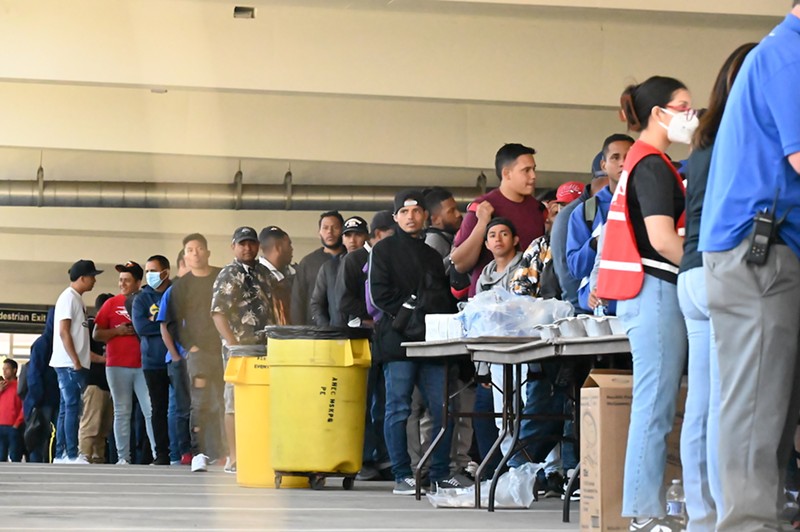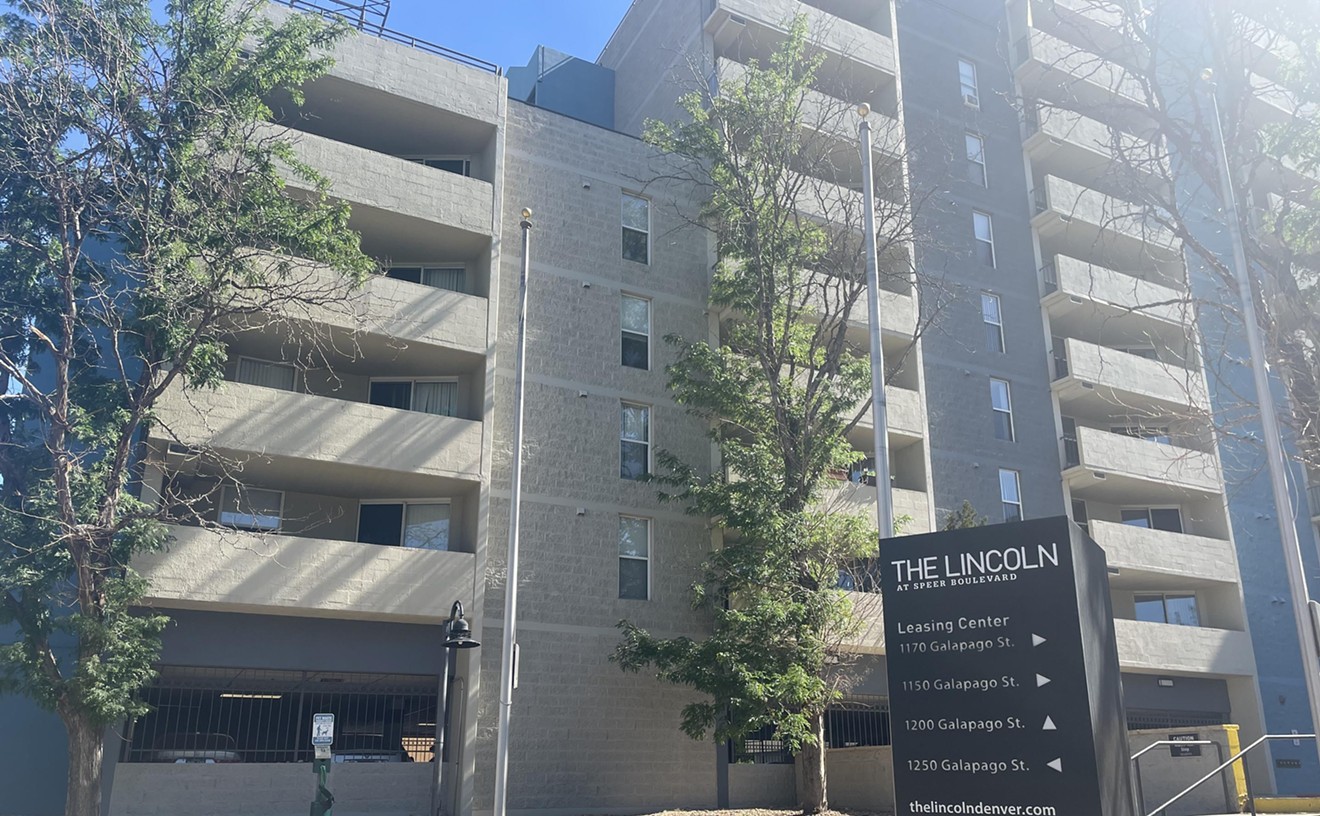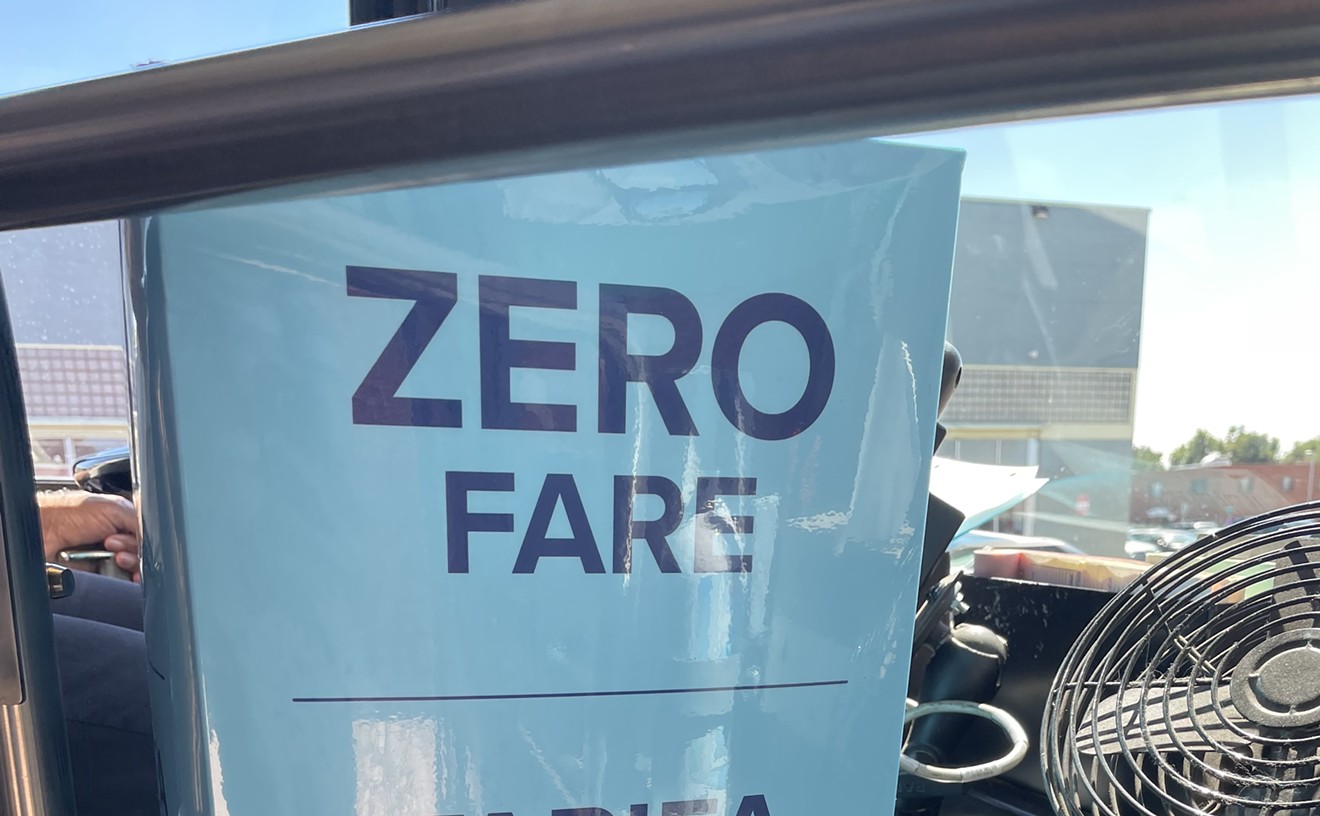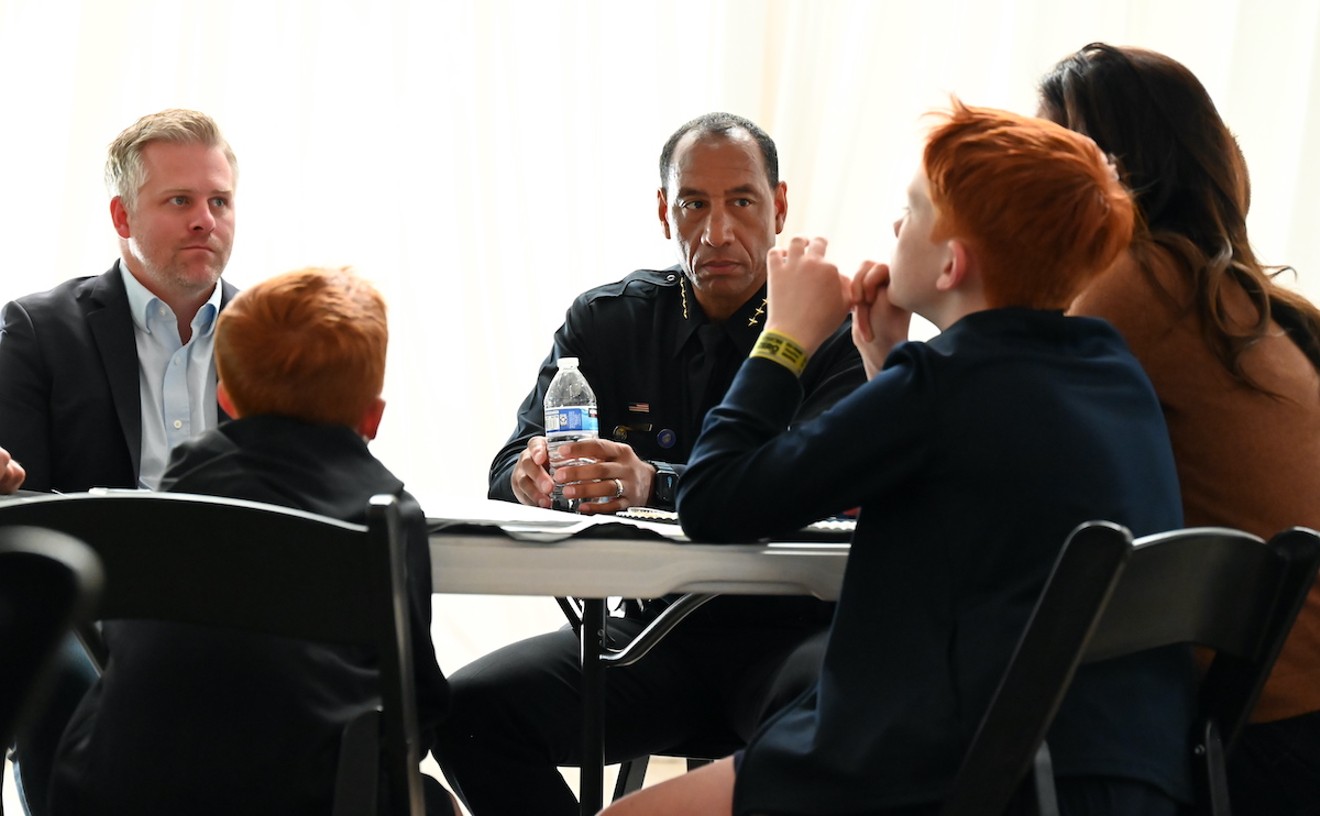Now he lives in an apartment off South Federal Boulevard with six strangers he met in a city shelter, waiting indefinitely for a judge to decide if he deserves temporary residential status to attain a Social Security number and begin working as an American citizen.
Alvarado is one of countless migrants in the Mile High City seeking asylum from the threats of violence they encountered in their home countries, with the number of arrivals and migrants staying here increasing again in recent weeks as they did back in May and June — when Alvarado and hundreds of others flocked here, causing former mayor Michael Hancock to open an emergency intake center.
On August 19, the number of migrants living in Denver passed 800 for the first time since June 6, according to City of Denver data. The recent uptick likely has to do with an increased number of families coming and the consistency of buses coming up from Texas, says Yoli Casas, executive director of ViVe Wellness, an organization whose mission is to foster wellness for low-income families.
"The bus coming from Texas, I feel like because that's been more consistent and happening more often, maybe we see the increase," Casas says. "And then families with children, you don't have one individual, you usually have four, five, six people to a family. It's not abundant, but if you have three families, that's eighteen people that are staying."
Casa adds, "We haven't seen that [before]. I feel like the increase is because of the number of people in their families with children."
Buses used to come to Denver from Texas about once a week, but during the past month, that rate has increased to about three times a week, notes Victoria Aguilar, spokesperson for Denver Human Services.
ViVe Wellness is one of the nonprofits that has been helping recently arrived migrants find housing and child care in Denver since April, along with Lutheran Family Services, Servicios de La Raza and the nonprofit Organización Papagayo.
Alvarado arrived in Denver on May 12. He had been working in Venezuela as a mechanic and handyman to make money and earn a better life for his wife and three children. Now the 39-year-old is a roofer — taking jobs where he can across the metro area to pay his bills and support his family.
Winters will be especially tough on him, he says, on account of all the snow hurting business.
Winters will be especially tough on him, he says, on account of all the snow hurting business.
"The hard part is coming," Alvarado says. "I know I have to keep taking care of myself. I don't expect the city to help me out. I crossed seven countries to get here. I know how to look out for myself at this point."
From May to August, the city went from housing over 1,000 people in shelters that Denver owns and leases to fewer than 500 at one point — but are now over 900 as of August 30, according to city data.
Mayor Mike Johnston is drafting a request for proposals to find an outside organization to handle Denver's migrant shelters, according to spokesperson Jordan Fuja. It's a sign of how Denver is preparing for a possible continued increase in arrivals, Aguilar adds.
"We're still not in an emergency posture, but we are beginning to feel some of the pressure from the number of migrant arrivals," Aguilar tells Westword. "If we're doing anything to prepare for a possible uptick, Mayor Johnston is working with city agencies, local community leaders to have an RFP that would contract out city services with supporting migrants."
The RFP "will make it easier" to house and assist migrants while Johnston also opens homeless shelters for residents, Aguilar says.
Mayor Mike Johnston is drafting a request for proposals to find an outside organization to handle Denver's migrant shelters, according to spokesperson Jordan Fuja. It's a sign of how Denver is preparing for a possible continued increase in arrivals, Aguilar adds.
"We're still not in an emergency posture, but we are beginning to feel some of the pressure from the number of migrant arrivals," Aguilar tells Westword. "If we're doing anything to prepare for a possible uptick, Mayor Johnston is working with city agencies, local community leaders to have an RFP that would contract out city services with supporting migrants."
The RFP "will make it easier" to house and assist migrants while Johnston also opens homeless shelters for residents, Aguilar says.
One area where ViVe Wellness has seen an obvious increase in migrants is in their summer camp for children, Casas says.
"The last few weeks of the camp, there were new kids, and they were the ones arriving by bus," she tells Westword. "Again, it's not abundant, but all of a sudden you have seventy children, and then you have eight more. ... A week later you have three more."
Over the past year, January saw the greatest number of migrants living in Denver — with nearly 2,000 being reported.
President Joe Biden ended the federal COVID emergency on May 11, resulting in the end of Title 42, a policy that allowed U.S. Border Patrol to turn migrants away at the border because of public health risks.
The waves of migrants that came in May and June were ultimately the result of expectations for more lenient immigration policies that would allow them to stay, according to migrants whom Westword talked to at the time.
"May had a huge increase, large increase, and then has slowly tapered since then," Casas says.
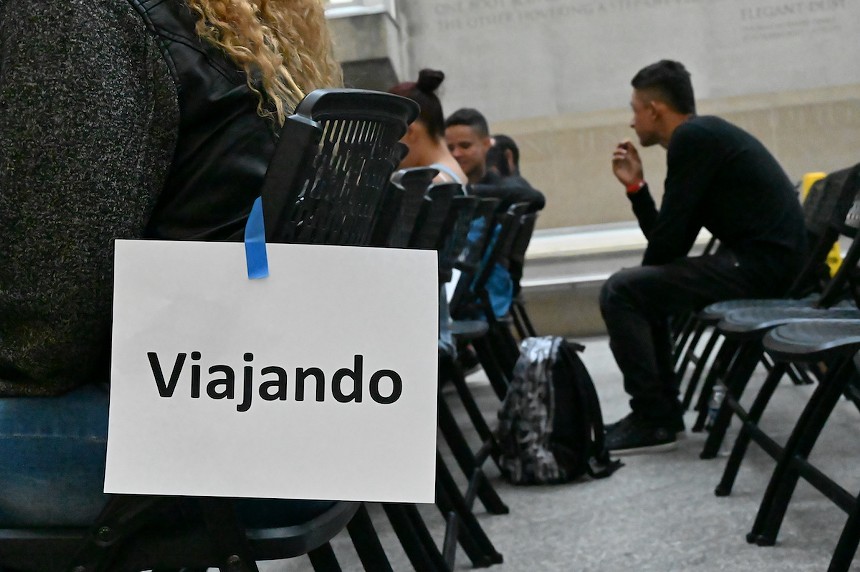
A sign on the side of a chair in Denver's emergency migrant intake center in May read "Viajando" ("Traveling") to separate those who were staying in Denver from those who were going to another location.
Bennito L. Kelty
It's scheduled to move again soon as events start taking place again at the Coliseum as of September 8. The intake center will likely set up in one of the Denver Human Services buildings, according to Casas.
Most of the migrants are coming from Venezuela, she says, with a few coming from Colombia, Nicaragua and very occasionally Peru. Alvarado is living with five other Venezuelans and one Colombian.
A bus still comes to Denver from Texas three days a week to drop off migrants who arrived at the U.S. southern border, Casas says. "It was not as overwhelming as it was last December, January, February, March and then May," she recalls. "But it's a consistent one, and most of them arrive by bus from Texas because it's free transport."
Among the recent group of migrants arriving in Denver, about half of them take off to a second location, she adds.
Because migrants have been coming here in large numbers since December 2022, more of them are established and connected to the recent arrivals. As a result, not as many need housing, Casas says.
Because migrants have been coming here in large numbers since December 2022, more of them are established and connected to the recent arrivals. As a result, not as many need housing, Casas says.
"They don't need help. They have come to live with these family members who have established themselves here, have jobs, and so they don't need to go through the sheltering system of the city," she explains. "We haven't seen that before, but people have been coming since December, January, so some of them are already established."
"Like anybody else, if you want to apply for an apartment, you have to go through the application process," Casas says.
"You've got to fill out the application, you've got to do a background check, you've got to make sure you make two and half times the rent. You have to follow everything the same. You're not treated special."
Families have a thirty-day limit for staying at shelters — a time period the City of Denver says it is willing to fund their stay. Single individuals have a 21-day limit.
"After that, they're out," Casas says. "They're homeless, or hopefully they have a plan."
One of the key differences with how the city is handling homelessness versus how it's handling migrants is that the city is offering the homeless people living spaces for a longer term, according to Casas — whereas migrants are expected to find out where they're going to live and work within a month's time, she says.
"With the homeless, what the new mayor is doing — which is great — is about focusing on our locals, our homeless, and it's more sustainable," Casas tells Westword. "This is thirty days; the other is sustainable, how do we make sure you have a roof, have something to eat, you're safe, in a clean environment. The other is thirty days and you have to have a plan."
The federal government also reimburses the city for sheltering migrants, Casas points out, as opposed to homelessness, which is more of a city-funded effort with some state funding, she says. Migrants also arrive in large numbers at once, but homelessness tends to build up gradually.
"When this happened in December, it was an emergency crisis, all these people showing up in the streets," Casas remembers. "You're talking about thousands at one time, thousands and thousands."
"With the homeless, what the new mayor is doing — which is great — is about focusing on our locals, our homeless, and it's more sustainable," Casas tells Westword. "This is thirty days; the other is sustainable, how do we make sure you have a roof, have something to eat, you're safe, in a clean environment. The other is thirty days and you have to have a plan."
The federal government also reimburses the city for sheltering migrants, Casas points out, as opposed to homelessness, which is more of a city-funded effort with some state funding, she says. Migrants also arrive in large numbers at once, but homelessness tends to build up gradually.
"When this happened in December, it was an emergency crisis, all these people showing up in the streets," Casas remembers. "You're talking about thousands at one time, thousands and thousands."
When Alvarado came to Denver from Venezuela in May, he says the city gave him thirty days to stay at a shelter. At the 28-day mark, he was told he had to move because the shelter was no longer going to be operating.
Alvarado wound up leaving without a place to go — living for six days by a 7-Eleven and then three days in a parking garage — before he found a place to stay.
Families, meanwhile, are proving more dependent on city-funded shelter, Casas says.
"We see more families with children...that go through the city (sheltering) system," she explains. "Individuals show up and they have their friends and families, and they're all set to go, so they don't even go through the system. There's consistency but nothing. It's doable. The shelters are not full. We're still following with the protocol, thirty days for families, 21 days for individuals. So it's not bad."
Casas predicts that the migrant situation in Denver isn't going anywhere, saying the city is going to be dealing with this "consistently." Luckily, she believes it is something that can be handled.
Feeling homesick, on the other hand, is a different story.

